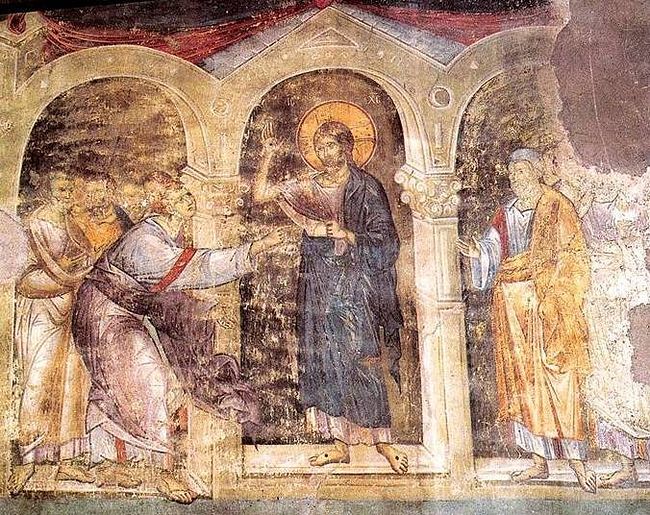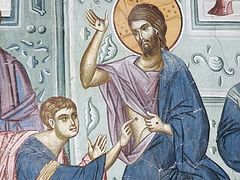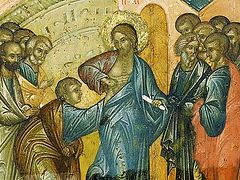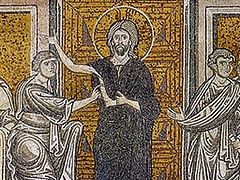Then, the same day at evening, being the first day of the week, when the doors were shut where the disciples were assembled, for fear of the Jews, Jesus came and stood in the midst, and said to them, “Peace be with you.” When He had said this, He showed them His hands and His side. Then the disciples were glad when they saw the Lord. So Jesus said to them again, “Peace to you! As the Father has sent Me, I also send you.” And when He had said this, He breathed on them, and said to them, “Receive the Holy Spirit. If you forgive the sins of any, they are forgiven them; if you retain the sins of any, they are retained.” Now Thomas, called the Twin, one of the twelve, was not with them when Jesus came. The other disciples therefore said to him, “We have seen the Lord.” So he said to them, “Unless I see in His hands the print of the nails, and put my finger into the print of the nails, and put my hand into His side, I will not believe.” And after eight days His disciples were again inside, and Thomas with them. Jesus came, the doors being shut, and stood in the midst, and said, “Peace to you!” Then He said to Thomas, “Reach your finger here, and look at My hands; and reach your hand here, and put it into My side. Do not be unbelieving, but believing.” And Thomas answered and said to Him, “My Lord and my God!” Jesus said to him, “Thomas, because you have seen Me, you have believed. Blessed are those who have not seen and yet have believed.” And truly Jesus did many other signs in the presence of His disciples, which are not written in this book; but these are written that you may believe that Jesus is the Christ, the Son of God, and that believing you may have life in His name. (John 20:19-31)
The celebration of the Resurrection is always a wonderful event, a foretaste of the Kingdom of God which is to come. But there is a reality that Pascha does not end all of life’s problems, nor resolve all of them, nor does it necessarily make them more tolerable. At midnight on Pascha we leave the safety of the church and go into the darkness of the night, into the world as it is without light. Yet we rejoice, though darkness is all around us we are carrying the Light of Christ within us. That Light of Christ shines and the darkness does not overcome it. The night becomes resplendent with the singing about Christ being risen from the dead. The Light which shone when God first spoke the universe into existence continues to shine in our hearts and lives. For that Light is Christ.
The full glory of God’s Kingdom is yet to be revealed, but now we thank God that we can experience here and now the great joy of the resurrection. Now we know of God’s victorious power and His great plan for our salvation.
The Kingdom of Heaven is breaking into our lives, but the world too continues to press in on our lives. On the day of the resurrection, the Apostle Thomas already doubted the truth of Christ. On Pascha Sunday, according to St Matthew’s Gospel, the disciples were filled with joy at meeting our Lord risen from the dead, “though some doubted” (Matthew 28:17) On the very day that Christ rose from the dead, already some of Christ’s most ardent faithful are already in doubt! The world continued intruding into their joy, hopes and dreams – and though they know the Good News, one week after the resurrection, they are still cowering in a room behind locked doors.
Despite the resurrection, the disciples are still afraid of dying. The world has not gone away and has not ended. The Kingdom of God has not come in all its power. They and we continue to have to cope with a fallen world and manage our lives in this fallen world.
The Apostles don’t conclude that the resurrection is not real or that they were mistaken in thinking they saw Jesus living, but the truth presents the fact that there is mystery in life. God’s ways are not our ways, and we have a hard time grasping His Truth. The world continually presses in on us. Christ has overcome the world, but He has not called us out of this world but rather to be a light to the world (John 17:15-16)
Here we are one week after celebrating the resurrection of Christ, and a few vestiges remain of our celebration – some flowers remain, but many have faded. So too some of those who joined us for Pascha have also faded away. One week after proclaiming the resurrection of Christ from the dead, we have already returned back to normal time. Life goes on.
And one week after Pascha, Thomas is still doubting the fact of the resurrection. Thomas’ doubt however is sometimes called blessed by some Church Fathers because it is reasonable, based on experience. It is doubt based in the fact that the dead do not come back to life. It is doubt based in fact and in fact is our doubt. We realize how hard it is to convince anyone else about why we believe in Christ and the resurrection.
The real world is relentless and rushes by pushing into the distant past the good news and placing new pressures on the disciples, problems, some old and some new, which must be faced. The 10 disciples who saw Christ risen from the dead on that first day of the week can’t even convince their fellow disciple, Thomas, that what they had seen is real and true.
The promise of the resurrection is not that our life will be easy, nor that our life will be free of problems, worries, troubles. The resurrection does not make it any easier to love one another, nor does it mean all believers will now be wonderfully loving to you. The Kingdom of God is breaking into the world and into our lives and yet it is still not fully realized.
The promise of the resurrection does not spare us trouble or sorrow, but offers us hope in the day of our trouble and sorrow. Bearing the cross of Christ, which we agreed to do as Christ’s disciples, is not the way to avoid difficulties in this world, nor is it the road to prosperity. Rather the Cross reminds us that our hope is still beyond this world and our hope is that this world is only a small part of the total reality of God’s Kingdom. There is a far bigger picture of which we are part, and reality itself, like the entire universe, is far bigger than we are able to comprehend or envision. Christ makes us part of that greater Kingdom. We can only live in the Light of the Resurrection by also facing the darkness of Good Friday and the Cross of Christ.
[Physicists speak of dark energy and dark matter which are invisible to us and yet make up most of what exists in the universe. Dark energy makes up 68% of what exists in the universe, and dark matter makes up 27% of the universe, which means the visible universe as vast as it is and which exists almost entirely beyond our grasp is still only 5% of all that exists. The Kingdom of God is much the same it constitutes far more time and space than all that has ever existed, and we only know an extremely small part of it. Planet earth, the only place in the universe we have lived, is a tiny part of the entire universe, and that universe is but a tiny part of the Kingdom of God.]
The world is awash with problems, but it is God who remains both a compass to us through the stormy sea of life and who is our destination, our safe harbor to whom we are sojourning. In God we find meaning and purpose to all that we experience and realize that nothing can separate us from the love of God.
Christ is risen! This was a fact the Apostles could not deny, but now they are faced with figuring out how do they live in this world which basically is unchanged by the good news.
The disciples have been changed by the Gospel, but the world is the same old world. And after celebrating Pascha, the resurrection of Christ, we too are faced with the task of returning to the world to live the Gospel and to be a light to all those still in darkness. The resurrection of Christ should mean that we see the world differently in His Light, and we live differently because now we live not just for this world but for life in the world to come.





